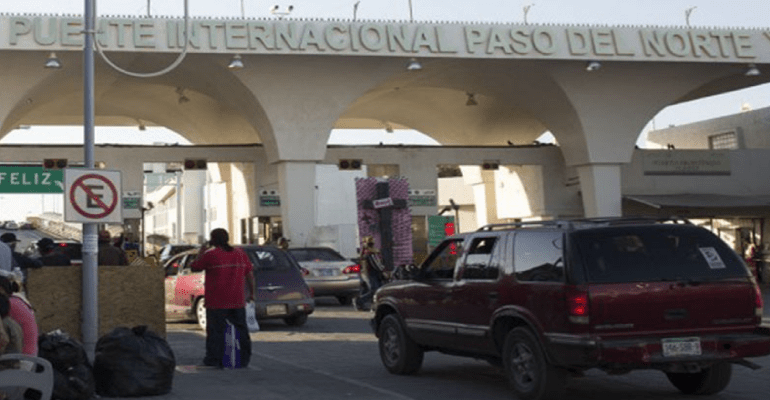
PHOENIX — As attacks against reporters in Mexico increase, a coalition of immigration lawyers and organizations that defend journalists are calling for the release of a Mexican reporter detained at the border after asking for political asylum in the United States.
Paris-based Reporters Without Borders is urging the U.S. government to release Martin Mendez Piñeda, a reporter fleeing Acapulco, Guerrero in southern Mexico.
“This journalist, who has been persecuted and threatened with death in his country, must be allowed to present his case for political asylum freely and with dignity before an immigration judge,” Emmanuel Colombié, the head of Reporters With Borders’ Latin America bureau, said in a statement issued by the organization.
Martin Mendez Pineda is being held an Immigration Customs Enforcement detention center in El Paso. He was taken into custody February 5th after requesting political asylum at an international bridge.
Mendez worked for Novedades Acapulco, where he said he faced death threats and federal police officers beat him for coverage of what he described as violent arrests carried out by police at the scene of a road accident last year.
|
Martin Mendez Pineda, a reporter for Novedades Acapulco, a newspaper Guerrero, Mexico is seeking political asylum in the U.S. after he said he faced death threats for reporting on police brutality. (Photo courtesy of the law offices of Carlos Spector) |
“Because of the Mexican Federal officers’ and Mexican Military’s ability to locate Mr. Mendez anywhere within the country, he is in imminent danger,” Carlos Spector, an immigration lawyer in El Paso representing Mendez said in a letter to ICE authorities. “He has no other option but to come to the United States to seek political asylum.”
Mendez passed a “credible fear” interview, a key step to determine whether an asylum applicant’s case moves forward, according to Spector, who specializes in political asylum cases. He said Mendez is asking to be released from detention on parole until an immigration judge decides his case. He said he will stay with his cousin, a U.S. citizen living in California.
ICE notified Mendez they would not grant him parole, citing concerns that Mendez “did not establish, to ICE’s satisfaction, substantial ties to the community” and would be a flight risk. “Imposition of a bond or other condition of parole would not ensure, to ICE’s satisfaction, your appearance at required immigration hearings pending the outcome of your case,” ICE authorities said in a notice sent to Mendez.
ICE officials declined to comment on the specific decision but in a statement said, “Parole determinations by U.S. Immigration and Customs Enforcement are made on a case-by-case basis, taking into account all aspects of the case, including safety considerations and any sensitivities involving the case.”
Menedez’s lawyer said President Donald Trump’s executive orders on immigration have led to “a blanket denial of parole” for asylum seekers.
“And so, as a result of that, we have come to learn that while, 40 to 50 percent of asylum seekers used to be granted access after passing credible fear… now its zero,” said Spector.
|
Martin Mendez Pineda, 26, a reporter for Novedades Acapulco, a newspaper in Guerrero, Mexico, said he faced death threats and is seeking political asylum in the U.S. (Photo courtesy of Carlos Spector) |
March has been a particularly bloody month for journalists in Mexico. Three reporters were murdered, the most recent Miroslava Breach, a 54-year-old reporter for the La Jornada, was gunned down in Chihuahua City March 23rd.
She was also a contributor for El Norte in Ciudad Juarez. The editor of the newspaper has since announced it will shut down, citing safety concerns. In a front-page article with the headline “Adios,” editor Oscar Cantu Murgia said he “is not willing to pay with one more life of my collaborators, or my own.”
The Committee to Protect Journalists counts 92 journalists and media workers who have been killed in Mexico since 1992, 38 of those murders have been confirmed as being directly linked to the journalists’ work with a majority of the cases unsolved.
“In terms of the justice system, impunity is kind of a norm,” Carlos Lauria, CPJ Americas program director, said. “One of the issues that we have seen is that this problem is going way beyond the press. It’s not just a problem for freedom only, it has become a serious freedom of expression crisis, in the sense that fundamental human rights are being affected by the violence.”
CPJ and Reporters Without Borders both cite Mexico as the most dangerous country in the western hemisphere for journalists, though measures of how many journalists have been murdered as a result of their work varies.
According to Reporters Without Borders, a record number of 11 journalists were killed in 2016.
Mexico is ranked 149th out of 180 countries in Reporters Without Borders’ World Press Freedom Index, which measures the degree of freedom available to journalists in a specific nation.
“Mexico is one of the most dangerous countries for the press in the world. Deadliest in the western hemisphere,” said Carlos Lauria, CPJ Americas program director “Many Mexicans and journalists are not able to exercise freely their freedom of expression because there’s this climate of fear and intimidation that it’s basically inhibiting the press from fulfilling its role…It is damaging the quality of the democratic system, no question about that.”


